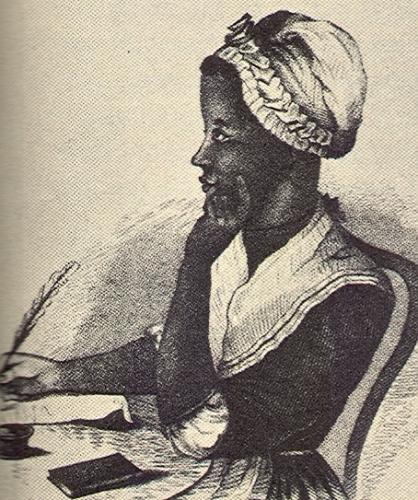 |
LITR 4231 Early American
Literature Sample Research Posts 2014 (research post assignment) Research Post 2 |
 |
Elisa Cortez
April 12, 2014
Women and Education in Early America
While researching information for my first post on Sor Juans Ines De La
Cruz, I became interested in learning how women in early America were educated.
I have always understood that women during those times were not given the
same opportunities as men, simply because they were expected to take care of the
home and raise the children. I understand the importance of education, because
many generations of women in my family were not able to go to school, much less
college. Being part of the first
generation of women in my family to attend college is something that I am very
proud of. I remember my mother
telling me that she learned basic reading, writing and math in school, but
learned more from her younger siblings and from her children.
She had to work to help provide for her family, as well as help raise her
younger brothers and sisters. It became apparent to me that many women in early
America were probably taught like my mother, only learning basic reading and
writing skills. If a woman wanted to further their education they had to find
other ways of teaching themselves.
I would like to find out how women in a male-dominated society were able to
educate themselves while only being expected to have domestic skills.
I used Google Scholar to find additional information regarding women and
education. I came across some
reasons why many men were opposed to an educated woman; first many men believed
that an “educated woman would not carry on the traditional roles of being a wife
and mother to her children[;] also they believed that women would gain an
identity outside of the home” (Solomon xviii). Those opinions of men made it
difficult if not impossible for women to go to school.
It was very difficult for any woman to have the opportunity for an
education that did not have anything to do with domestic skills.
In the colonial era, many girls were taught to read at an early age so they can
learn to read the Bible. They were also expected to educate their young children
but were not allowed to teach outside their home (Mays 127). Their skills were
limited mainly to reading and not very much else. Women were expected to teach
basic reading skills to all of their children, but many women were not able to
write themselves. The opportunity
for children to learn how to write was often given only to the male children,
not the females, because it was expensive to hire a teacher and pay for paper,
and men were more expected to have a profession, not women (Mays 127). Women did
learn to read in early America, but beyond anything further they were not given
the opportunity and many were left to learn on their own.
I went back to some of the research I had done on my first post about Sor Juana
Ines De La Cruz, because she was part of the reason why I wanted to learn about
women’s education in early America.
I had used Google Scholar to find information about her and her early childhood.
I had discovered that she was primarily self- taught, learning how to
read and write at a young age by reading books from her grandfather’s private
library (Merrim XI). It was rare for women in that time period to have access to
education as men did. She continued her self -education by reading and writing
in the convent as a nun. She ultimately was able to publish many famous poems
like You Men and
I Approach and I Withdraw, as well as
Respuesta A Sor Filotea – 1691, an intellectually written response to a
critique of the Bishop of Puebla, where she defends her right to study and write
artistically (Luciani 21). She is
an example of a woman that found ways to learn, regardless of laws that
prohibited education of women (Dr. White’s Course site).
I wanted to learn about other female writers that we had learned in
class, I searched for a biography of Anne Bradstreet on the Internet. I
discovered www.annebradstreet.com;
there I was able to find some information about how she educated herself when
her husband was away on business. I
discovered that Anne Bradstreet had began reading as a way to keep her from
being lonely while her husband was away, and as a way to educate her children.
She had read books from her father’s library, learning about science,
religion, art and medicine. She had
found a way to educate herself and began writing even though it was not
appropriate for a woman to write poems during that time period (www.annebradstreet.com).
Most of the research I had done clearly reveals the difficult struggle
women had to obtain an education over men.
Women were expected to learn only how to read so they can read the Bible
and teach their children, but beyond any further education it was very difficult
to obtain. Many women who did try to continue to further their education, had to
do so in secret and were self-taught, like Sor Juana Ines De La Cruz and Anne
Bradstreet. Though, these women
were able to eventually publish their writings, it still was a struggle for
women to obtain an education outside the home.
I wanted to see how women were able to achieve an education in a
male-dominated society, I feel that I was able to find that women who were given
any opportunity to have an education did so by either teaching themselves or
learning in secret. I think back to
my mother and how she had to learn from her siblings and children.
It’s apparent that many women through out our history had to learn the
best way they could, mainly by themselves or by learning from family members.
Work Cited
Bradstreet, Anne. Biography.
www.annebradstreet.com.
2002.
Luciani, Frederick. Literary
Self-fashioning in Sor Juana Ines de la Cruz. Cranbury. Rosemon Publishing &
Printing Corp. 2004. Print.
Mays, Dorothy A. Women in Early America:
Struggle, Survival, and Freedom in a New World. Santa Barbara, California.
ABC-CLIO, Inc. 2004. Print.
Merrim, Stephanie. Early Modern Women’s
Writing and Sor Juana Ines de la Cruz. Nashville. Vanderbilt University
Press. 1999. Print.
Soloman, Barbara Miller. In the Company of Educated Women: A History of Women
and Higher Education. Binghamton, New York. Yale University Press. 1985. Print.
White, Craig. LITR 4231 Early American Literature.
http://coursesite.uhcl.edu/HSH/Whitec/LITR/4231. 2014.
|
|
|
|

